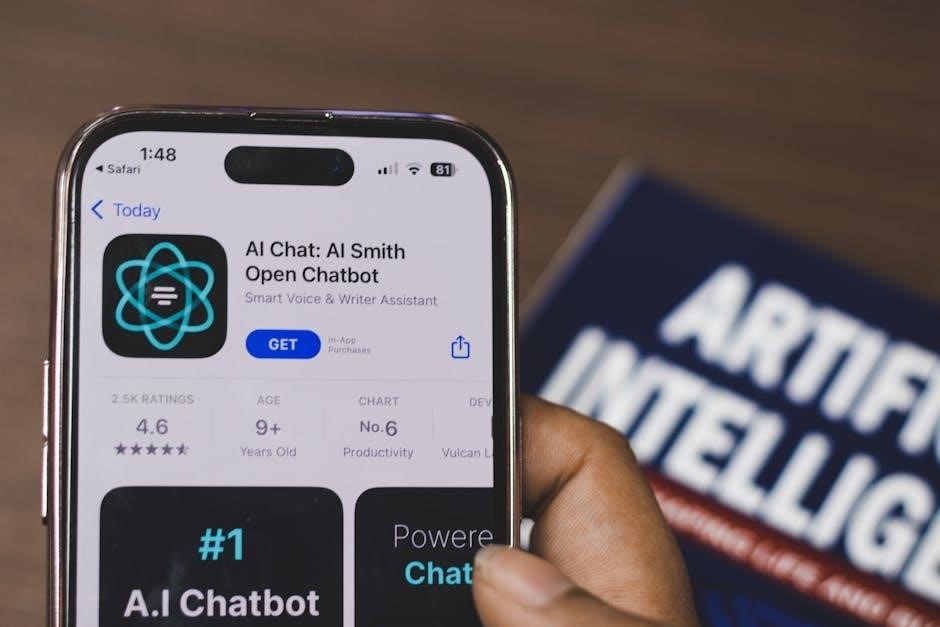Machine learning transforms mobile apps by enabling intelligent features, enhancing user interactions, and providing personalized experiences. This section explores innovative ways to integrate ML into mobile applications, offering practical solutions and real-world applications to revolutionize app development.
Overview of Machine Learning in Mobile Apps
Machine learning in mobile apps integrates powerful algorithms and frameworks to create intelligent, adaptive, and user-centric experiences. By leveraging tools like TensorFlow Lite and Core ML, developers can embed ML models directly into apps, enabling features such as image recognition, speech processing, and personalized recommendations. These models process data locally on devices, ensuring real-time performance and privacy. Key applications include image and video processing, speech recognition, and behavior prediction, which enhance user engagement and satisfaction. ML also powers health monitoring and security systems, making apps more versatile and functional. With advancements in mobile ML, developers can now build apps that learn from user interactions, delivering dynamic and tailored experiences.
Importance of Machine Learning in Modern Mobile Applications
Machine learning has become a cornerstone of modern mobile applications, driving innovation and enhancing user experiences. By enabling apps to learn from data, ML fosters personalized interactions, such as tailored recommendations and predictive analytics. It also improves operational efficiency through automation and real-time decision-making. With the rise of on-device ML, apps can process data locally, ensuring privacy and reducing latency. This technology is vital for emerging applications like health monitoring, speech recognition, and security systems, making apps more intelligent and responsive. As data volumes grow, ML’s ability to analyze patterns and adapt to user behavior becomes indispensable, revolutionizing how mobile apps function and deliver value to users.
Free Resources for Machine Learning Projects
Discover a wealth of free resources to kickstart your machine learning projects for mobile applications. From comprehensive PDF guides and tutorials to open-source datasets, these tools empower developers to build intelligent apps. Platforms offer downloadable datasets covering domains like image processing, speech recognition, and recommendation systems. Additionally, curated lists of machine learning projects provide inspiration and practical examples, complete with Python code. Frameworks such as TensorFlow Lite and Core ML offer pre-built models and libraries to streamline development. These resources are ideal for both beginners and advanced developers, ensuring access to cutting-edge technologies without financial barriers. Leveraging these resources can accelerate your learning and implementation of ML in mobile applications.

Popular Domains for Machine Learning Projects
Explore top domains like image/video processing, speech/language processing, recommendation systems, health/medical apps, and security/surveillance. These areas drive innovation in mobile ML applications.
Image and Video Processing
Image and video processing is a vibrant domain in mobile machine learning, enabling apps to interpret and manipulate visual data. With frameworks like TensorFlow Lite and Core ML, developers can build models for real-time object detection, facial recognition, and image classification. These technologies power popular features in apps like Snapchat and Instagram, where filters and effects are applied dynamically. Additionally, video processing enhances capabilities such as motion tracking and scene analysis, which are essential for surveillance and healthcare apps. By leveraging pre-trained models and optimizing them for mobile, developers can deliver seamless user experiences. This domain also supports advanced use cases like medical imaging analysis and augmented reality, making it a cornerstone of modern mobile innovation. Free resources and datasets, such as OpenCV and ImageNet, further accelerate development in this field.
Speech and Language Processing
Speech and language processing is revolutionizing mobile apps by enabling voice-driven interactions and advanced text analysis. Techniques like Natural Language Processing (NLP) and Automatic Speech Recognition (ASR) power features such as voice assistants, real-time translation, and sentiment analysis. Frameworks like TensorFlow Lite and Core ML facilitate the integration of these technologies into mobile platforms. Applications include virtual assistants, chatbots, and voice-controlled interfaces, enhancing user accessibility and engagement. Additionally, text-to-speech and speech-to-text capabilities are transforming how users interact with apps. Developers can leverage open-source libraries and datasets to build custom models for specific use cases, such as voice authentication or language translation. These innovations make speech and language processing a critical component of modern mobile app development, offering endless possibilities for creating intelligent and intuitive user experiences. Free resources and tutorials are widely available to help developers get started with these advanced projects.
Recommendation Systems
Recommendation systems are a cornerstone of personalized user experiences in mobile applications. By leveraging machine learning algorithms, these systems analyze user behavior, preferences, and historical data to suggest relevant content, products, or services. Techniques like collaborative filtering, content-based filtering, and hybrid models enable apps to deliver tailored recommendations, enhancing user engagement and satisfaction. Mobile apps across e-commerce, entertainment, and travel industries widely adopt these systems to improve conversion rates and user retention. Tools like TensorFlow Lite and Core ML facilitate the deployment of lightweight recommendation models on mobile devices. Developers can access free datasets and tutorials to build custom recommendation systems, making them a vital component of modern mobile app development. These systems not only drive user satisfaction but also create competitive advantages for businesses.

Health and Medical Applications
Machine learning is revolutionizing healthcare through innovative mobile applications. These apps leverage ML to diagnose diseases, monitor health metrics, and provide personalized treatment recommendations. Techniques like image classification enable early detection of conditions via MRI scans or X-rays, while predictive analytics forecast patient outcomes. Mobile apps can analyze user inputs, such as symptoms or wearable device data, to offer real-time health insights. Privacy and data security are critical in these applications, ensuring sensitive information remains protected. Developers can utilize free datasets and frameworks like TensorFlow Lite to build lightweight health-focused models. From fitness tracking to chronic disease management, ML-powered health apps are transforming patient care and empowering users to take control of their well-being. These applications highlight the potential of ML to improve healthcare accessibility and effectiveness globally.
Security and Surveillance
Machine learning plays a pivotal role in enhancing security and surveillance in mobile applications. By leveraging advanced algorithms, apps can detect threats, recognize patterns, and ensure data protection. Facial recognition systems, powered by ML, enable secure biometric authentication, while intrusion detection models monitor for suspicious activities. Surveillance apps utilize real-time object detection to identify potential risks, such as unauthorized access or unusual behavior. ML models analyze data from cameras, sensors, and user inputs to provide actionable insights. Privacy concerns are addressed through secure data processing frameworks like TensorFlow Lite and Core ML, ensuring compliance with regulations. These applications are vital for safeguarding sensitive information and maintaining user trust in mobile platforms. The integration of ML in security systems has become indispensable for modern mobile app development, offering robust solutions to combat evolving threats.

Tools and Frameworks for Mobile Machine Learning
Popular tools like TensorFlow Lite, Core ML, Caffe, and Scikit-learn enable efficient integration of machine learning into mobile apps, supporting real-time processing and optimized model deployment.
TensorFlow Lite
TensorFlow Lite is a lightweight version of TensorFlow, optimized for mobile and embedded devices. It enables on-device machine learning inference, making it ideal for Android and iOS apps. Developers can deploy pre-trained models for tasks like image classification, object detection, and speech recognition. TensorFlow Lite models are smaller and faster, ensuring low latency and efficient performance. The framework supports model personalization, allowing apps to adapt to user behavior. It also integrates seamlessly with tools like Android Studio and Xcode. TensorFlow Lite is widely used in projects like real-time object detection and personalized recommendations. Its documentation includes guides for converting models to TensorFlow Lite format and optimizing them for mobile use. This makes it a preferred choice for building intelligent, responsive mobile applications.
Core ML
Core ML is Apple’s framework for integrating machine learning models into iOS, macOS, watchOS, and tvOS apps. It enables fast and efficient on-device inference, leveraging Apple’s hardware for optimal performance. Core ML supports various model types, including neural networks and decision trees, making it versatile for tasks like image classification, natural language processing, and recommendations. Developers can easily convert models from popular frameworks like TensorFlow and PyTorch into Core ML format. The framework integrates seamlessly with Swift and Xcode, simplifying the deployment process. Core ML also supports model updates and personalization, enhancing user experiences. Its lightweight and efficient design ensures low latency and minimal battery consumption, making it ideal for mobile applications. Apple regularly updates Core ML with new features, solidifying its role as a cornerstone of machine learning on Apple platforms.
Caffe
Caffe is a popular open-source deep learning framework designed for high-performance and flexibility. Known for its speed and modularity, it is widely used for computer vision tasks, particularly image and video processing. Caffe’s architecture allows for rapid prototyping and research, making it a favorite among developers for building and deploying machine learning models. Its C++ backend ensures efficient computation, while its Python interface facilitates easy integration with mobile applications. Caffe supports GPU acceleration through CUDA, enabling fast training and inference. Additionally, its tools for model conversion and optimization make it suitable for mobile environments. With an active community and extensive documentation, Caffe remains a powerful tool for implementing machine learning projects on mobile platforms, offering robust support for real-time processing and scalable solutions.
Scikit-learn
Scikit-learn is a widely-used open-source machine learning library for Python, offering a diverse range of algorithms for classification, regression, clustering, and more. While primarily designed for desktop and web applications, its models can be serialized and integrated into mobile apps using frameworks like TensorFlow Lite or Core ML. Developers often train models with Scikit-learn on desktops and then deploy them to mobile platforms. Its simplicity and extensive library make it ideal for prototyping and research. Additionally, Scikit-learn supports model serialization via pickle or joblib, enabling seamless deployment across platforms. This flexibility allows developers to leverage its powerful algorithms for mobile applications, ensuring robust performance and scalability in real-world scenarios.

Practical Implementation Tips
Optimize ML models for mobile by reducing size and computational demands. Ensure data privacy and security in app development. Implement real-time processing for seamless user experiences.
Optimizing Machine Learning Models for Mobile
Optimizing machine learning models for mobile applications is crucial for ensuring efficient performance and seamless user experiences. Techniques like quantization and pruning help reduce model size and computational demands. TensorFlow Lite and Core ML are popular frameworks that enable model optimization for mobile platforms. By converting models into lightweight formats, developers can deploy ML capabilities without compromising app performance. Additionally, leveraging hardware accelerators like GPUs and NPUs enhances processing speed. Balancing model accuracy and efficiency is key, as over-optimization may degrade performance. Regular testing on diverse devices ensures compatibility and consistent functionality. These strategies empower developers to deliver powerful, yet efficient, ML-powered mobile applications.
Ensuring Privacy and Security in ML Apps
Ensuring privacy and security in ML apps is essential to protect sensitive user data and maintain trust. Developers must implement robust measures to safeguard data, including encryption and secure authentication protocols. Data privacy is a critical concern, requiring adherence to regulations like GDPR and CCPA. Techniques such as federated learning and differential privacy help protect data during training. Encrypting data both at rest and in transit prevents unauthorized access. Additionally, access controls and secure API endpoints must be implemented to prevent breaches. Regular security audits and penetration testing are vital to identify vulnerabilities. By prioritizing privacy and security, developers can build trustworthy ML-powered mobile applications that comply with legal standards and user expectations.
Real-Time Processing in Mobile Applications
Real-time processing in mobile applications is crucial for delivering instantaneous responses, enhancing user experience, and enabling tasks like object detection and speech recognition. Machine learning models must be optimized for low latency and efficient computation to handle real-time data. Frameworks like TensorFlow Lite and Core ML are designed to deploy lightweight models that run smoothly on mobile devices. Techniques such as model quantization and pruning reduce computational demands without sacrificing accuracy. Edge computing also plays a role by processing data locally, minimizing latency and bandwidth usage. Real-time ML applications, such as augmented reality and live language translation, rely on these optimizations to function seamlessly. Ensuring efficient real-time processing is vital for building responsive and scalable ML-powered mobile apps;

Free PDF Resources for Machine Learning Projects
Discover free PDF guides and tutorials for machine learning projects, offering detailed insights into model implementation, frameworks, and real-world applications for mobile development.
Downloadable Guides and Tutorials
” are widely available for download. These resources are ideal for both beginners and experienced developers, offering a hands-on approach to building intelligent mobile apps. They also include tips for optimizing models and ensuring privacy, making them invaluable for modern app development.
Open Source Datasets for Mobile ML Projects
Access a wide range of open source datasets specifically designed for mobile machine learning projects. These datasets cover various domains, including image processing, speech recognition, and healthcare, providing developers with diverse options for training and testing models. Popular datasets like ImageNet for computer vision and UCI Machine Learning Repository for various ML tasks are widely used. Platforms like Kaggle and Google Dataset Search offer extensive collections of datasets tailored for mobile applications. Additionally, datasets optimized for frameworks like TensorFlow Lite and Core ML are available, ensuring compatibility with mobile platforms. These resources enable developers to build and optimize ML models effectively, making it easier to integrate advanced features into mobile apps.
Curated Lists of Machine Learning Projects
Discover curated lists of machine learning projects tailored for mobile applications, offering a structured approach to learning and implementation. These lists provide a variety of projects, from introductory to advanced, covering domains like image processing, speech recognition, and recommendation systems. Platforms like Kaggle and GitHub host extensive collections of ML projects optimized for mobile platforms. For instance, projects leveraging TensorFlow Lite and Core ML are highlighted, enabling developers to integrate AI into Android and iOS apps seamlessly. Additionally, resources like Packt Publishing offer free guides and tutorials, making it easier for developers to explore and implement these projects effectively. These curated lists are designed to enhance skills and foster innovation in mobile ML development.

Advanced Machine Learning Projects
Advanced machine learning projects focus on real-time processing, personalized user experiences, and complex tasks like object detection. These projects push the boundaries of mobile app capabilities, enabling smarter, faster, and more intuitive applications.
Predicting User Behavior in Mobile Apps
Predicting user behavior in mobile apps is a powerful application of machine learning, enabling developers to anticipate actions like purchases, engagement, or churn. By analyzing historical data, such as usage patterns, session duration, and interaction trends, ML models can identify tendencies and preferences. Techniques like classification and regression are commonly used to build predictive systems. These models help personalize recommendations, optimize app features, and improve retention strategies. Real-time processing capabilities allow for dynamic adjustments based on user activity, enhancing overall app performance. Developers can leverage frameworks like TensorFlow Lite and Core ML to integrate these predictive models seamlessly into mobile applications. By understanding user behavior, apps can deliver more tailored experiences, increasing satisfaction and driving business growth. This approach is particularly valuable for e-commerce, gaming, and social media platforms, where user insights are crucial for success.
Personalized User Experiences
Machine learning enables mobile apps to deliver personalized user experiences by analyzing individual preferences and behavior. Through techniques like collaborative filtering and deep learning, apps can tailor content, recommendations, and interfaces to match user needs. For instance, ML algorithms can adapt app layouts, suggest relevant features, or curate content based on usage patterns. Real-time data processing allows for dynamic adjustments, ensuring experiences remain relevant and engaging. Context-aware systems, powered by ML, can adjust settings or offer suggestions based on location, time, or device usage. These personalized experiences enhance user satisfaction, increase engagement, and foster loyalty. By leveraging frameworks like TensorFlow Lite and Core ML, developers can seamlessly integrate these capabilities into mobile applications, creating a unique and adaptive environment for each user. This level of personalization is transforming how users interact with mobile apps, making them more intuitive and user-centric.
Real-Time Object Detection
Real-time object detection is a cutting-edge application of machine learning in mobile apps, enabling devices to identify and classify objects within images or video streams instantly. Frameworks like TensorFlow Lite and Core ML optimize ML models for mobile, ensuring fast and efficient processing. These models can detect objects such as faces, text, or specific items, enhancing apps like augmented reality, surveillance, and photo editing; Advanced techniques like YOLO (You Only Look Once) and SSD MobileNet are commonly used for their balance of speed and accuracy. By leveraging device hardware and optimized algorithms, real-time object detection delivers seamless experiences without compromising performance. This technology is revolutionizing industries, from retail to healthcare, by enabling smarter, interactive, and responsive mobile applications. Developers can integrate these capabilities to create innovative solutions that enhance user engagement and productivity.

Final Year Projects for Students

Explore curated machine learning projects for academic purposes, designed to enhance learning and scoring better marks. Downloadable PDF guides offer detailed insights and practical implementations.
Machine Learning Projects for Academic Purposes
Machine learning projects for academic purposes are designed to provide students with hands-on experience in developing intelligent mobile applications. These projects cover a wide range of domains, from image processing to recommendation systems, offering practical insights into real-world applications. Resources such as free PDF guides and eBooks are available, detailing step-by-step implementations and code examples. Students can explore projects like speech recognition, health monitoring, and personalized user experiences, which are both educational and innovative. These projects not only enhance technical skills but also prepare students for advanced research and industry challenges. By leveraging tools like TensorFlow Lite and Core ML, students can build functional ML models optimized for mobile devices, ensuring a seamless learning experience.
Scoring Better Marks with ML Projects

Machine learning projects are an excellent way for students to showcase their skills and earn top grades. By leveraging free PDF resources and downloadable guides, students can access comprehensive tutorials and datasets to build innovative mobile applications. Projects like image classification, speech recognition, and personalized recommendations demonstrate practical understanding and real-world application of ML concepts. Proper documentation, clean code, and clear explanations are key to impressing evaluators. Tools like TensorFlow Lite and Core ML simplify model implementation, allowing students to focus on creativity and functionality. By delivering well-structured and impactful projects, students can highlight their technical prowess and problem-solving abilities, significantly enhancing their academic performance and scoring potential.

